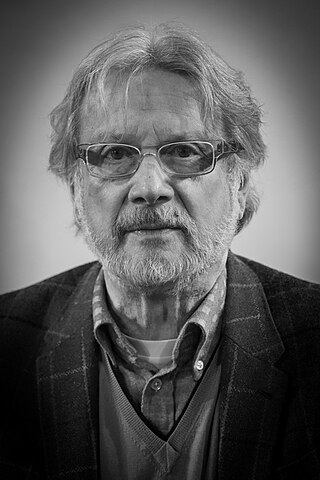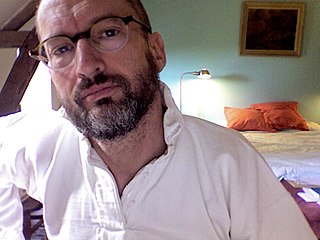
The Joint United Nations Programme on HIV and AIDS is the main advocate for accelerated, comprehensive and coordinated global action on the HIV/AIDS pandemic.

World AIDS Day, designated on 1 December every year since 1988, is an international day dedicated to raising awareness of the AIDS pandemic caused by the spread of HIV infection and mourning those who have died of the disease. The acquired immunodeficiency syndrome (AIDS) is a life-threatening condition caused by the human immunodeficiency virus (HIV). The HIV virus attacks the immune system of the patient and reduces its resistance to other diseases. Government and health officials, non-governmental organizations, and individuals around the world observe the day, often with education on AIDS prevention and control.

Daniel Defert was a French sociologist and HIV/AIDS activist. Partner to the late Michel Foucault, Defert co-founded France's first AIDS advocacy group, AIDES, following Foucault's death from complications related to the disease. Defert was the heir to Foucault's estate.
This is a timeline of HIV/AIDS, including but not limited to cases before 1980.
The human immunodeficiency virus (HIV), which causes AIDS, varies in prevalence from nation to nation. Listed here are the prevalence rates among adults in various countries, based on data from various sources, largely the CIA World Factbook.

Didier Lestrade, is a French author, magazine publisher, AIDS and LGBT rights advocate.

In 2008, 4.7 million people in Asia were living with human immunodeficiency virus (HIV). Asia's epidemic peaked in the mid-1990s, and annual HIV incidence has declined since then by more than half. Regionally, the epidemic has remained somewhat stable since 2000.

And the Band Played On is a 1993 American television film docudrama directed by Roger Spottiswoode. The teleplay by Arnold Schulman is based on the best-selling 1987 non-fiction book And the Band Played On: Politics, People, and the AIDS Epidemic by Randy Shilts, and is noteworthy for featuring both a vast historical scope, as well as an exceptionally sprawling cast.

The Democratic Republic of the Congo was one of the first African countries to recognize HIV, registering cases of HIV among hospital patients as early as 1983.
Although Senegal is a relatively underdeveloped country, HIV prevalence in the general population is low at around 0.08 per 1000 people, under 1% of the population. This relatively low prevalence rate is aided by the fact that few people are infected every year – in 2016, 1100 new cases were reported vs 48,000 new cases in Brazil. Senegal's death due to HIV rate, particularly when compared it to its HIV prevalence rate, is relatively high with 1600 deaths in 2016. Almost two times as many women were infected with HIV as men in 2016, and while almost three times as many women were receiving antiretroviral therapy (ARV) as men, only 52% of HIV positive people in Senegal received ARV treatment in 2016.
Honduras is the Central American country most adversely affected by the HIV/AIDS epidemic. It is estimated that the prevalence of HIV among Honduran adults is 1.5%.
The French National AIDS Council is an advisory body established in 1989 with a mission of "to offer its views on the problems faced by society as a result of AIDS and to make useful suggestions to the government".

Safiatou Thiam is a Senegalese public health doctor, a specialist in HIV/AIDS and former Minister of Health and Disease Prevention in the government of Cheikh Hadjibou Soumaré.She later became Executive Secretary of CNLS National Council against AIDS
Since reports of emergence and spread of the human immunodeficiency virus (HIV) in the United States between the 1970s and 1980s, the HIV/AIDS epidemic has frequently been linked to gay, bisexual, and other men who have sex with men (MSM) by epidemiologists and medical professionals. It was first noticed after doctors discovered clusters of Kaposi's sarcoma and pneumocystis pneumonia in homosexual men in Los Angeles, New York City, and San Francisco in 1981. The first official report on the virus was published by the Center for Disease Control (CDC) on June 5, 1981, and detailed the cases of five young gay men who were hospitalized with serious infections. A month later, The New York Times reported that 41 homosexuals had been diagnosed with Kaposi's sarcoma, and eight had died less than 24 months after the diagnosis was made.

Jacques Leibowitch was a French medical doctor and clinical researcher known for his contributions to the knowledge and treatment of HIV and AIDS, starting with his initial designation of a human retrovirus as the cause of AIDS, and his ground-breaking use of triple combination therapy for the effective control of HIV in the patient. A practicing physician in the infectiology department of the Raymond Poincaré University Hospital of Garches, University lecturer Emeritus, he led the treatment program ICCARRE that proposes a dramatic reduction of weekly anti-HIV drug intake, down to 2-3 anti-viral pills a day taken 2 to 3 or 4 days a week, as opposed to the presently recommended seven days a week, as still universally prescribed. These reduced medical dosages are adequate, necessary and sufficient according to the results of his exploratory clinical research carried out since 2003. He is the author of the books "Un virus étrange venu d'ailleurs", and "Pour en finir avec le sida".

Jean Le Bitoux was a French journalist and gay activist. He was the founder of Gai pied, the first mainstream gay magazine in France. He was a campaigner for Holocaust remembrance of homosexual victims. He was the author of several books about homosexuality.
Alice Ouédraogo is a Burkinabé public health official. A lawyer by profession she has worked extensively with the International Labour Organization (ILO). Ouédraogo was ILO representative to Cameroon and Ethiopia and also director of its Central Africa region. She is currently head of the ILO HIV/AIDS programme and works to reduce the transmission of HIV and increase the number of people in treatment.
Christine Kafando is a Burkinabé HIV/AIDS activist. Since the 1990s, she has been active in HIV/AIDS prevention and response efforts. For her work, she has been recognized by Burkina Faso's Order of Merit and France's Legion of Honour.

Jeanne Gapiya-Niyonzima is a human rights activist from Burundi. She is the chair and founder of the National Association for Support for HIV-Positive People with AIDS (ANSS) and was the first person from the country to publicly admit they had HIV.











